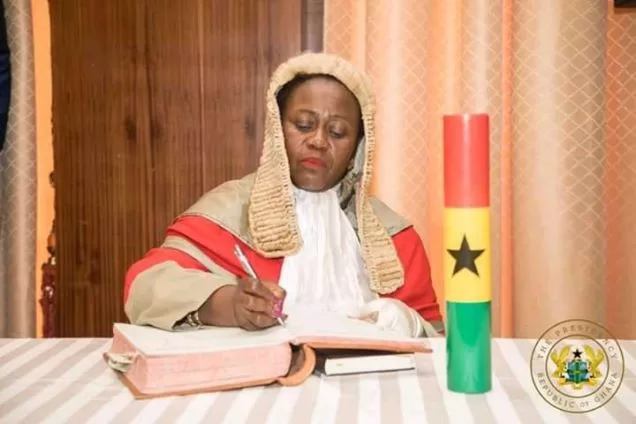The dissent judgment of Supreme Court Judge, Justice Yonny Kulendi, on 28 February, in a case between celebrated investigative Journalist, Anas Aremeyaw Anas and Assin Central Member of Parliament, Kennedy Agyapong, has started stirring up discussions about the conduct of some judges in the country.
Justice Kulendi, in his epic judgment described Anas as a victim of judicial defamation, “a violation which, in my view, is more grievous than his complaint against the Interested Party [Kennedy Agyapong] which landed him before the trial judge in the first place.”
Read Justice Kulendi:
“I find it even more perplexing that a court exercising civil jurisdiction would find that the Applicant [Anas] is guilty of having taken bribes and being dishonest, fraudulent, a cheat, an extortionist, a thief, a blackmailer and corrupt. Equally baffling is the trial court’s finding that a description of the Applicant as “a criminal, murderer, extortionist, blackmailer, corrupt, landgrabber, tax evader, bribe taker, cheat, interferer in the administration of justice, email hacker” among others are truthful and factual.
There can be no greater affront to the rights and honour of a litigant who resorts to the sanctuary of justice to vindicate his rights than this pre-conceived, biased, prejudiced and ill-motivated views which the trial judge held of the Applicant even before he embarked on a trial of the case before him.
Needless to say that the trial judge was merely pretending to adjudicate even though he was already harboring these opinions of the Applicant and animosities against him for his work, methodologies, and prominence…The Applicant is, to say the least, a victim of judicial defamation, a violation which, in my view, is more grievous than his complaint against the Interested Party [Kennedy Agyapong] which landed him before the trial judge in the first place.
…his personal reservations, disapproval and dislike for the Applicant and his modus operandi had poisoned his mind, blinded and disabled him from being an open-minded and impartial adjudicator of the matters before him…One would ask, was the Applicant on trial for murder, terrorism or the host of other crimes that were imputed to him by the judge? Was the court exercising a criminal jurisdiction in a defamation suit?…
Short of sentencing the Applicant, the trial judge, who appears to have been actuated by ill-will, malice, dislike, and complete disapproval of the Applicant’s methods and investigative journalism, could not restrain himself from pronouncing a conviction and condemning the Applicant as an outright criminal, extortionist and blackmailer, masquerading as a journalist.
This type of unrestrained intemperate judicial arbitrariness, motivated by obvious personal dislike of a citizen, in the sanctuary of justice of all places, ought to be deprecated, disapproved and rejected in the strongest of terms.
The toxic, caustic and unsavoury description of the Applicant by the trial judge is a classic example of a violent abuse of judicial power, privilege and prerogative in the deployment of language under the guise of a judgment.”
Recall that Anas Aremeyaw Anas, following his loss in a defamation case against Mr. Kennedy Agyapong, pursued two legal actions-an appeal at the Court of Appeal and a Certiorari application before the Supreme Court, both aim at reviewing the decision of a lower court.
Unlike an appeal, Certiorari is not an automatic right. it is at the court’s discretion to grant it.
In the Certiorari application, Anas argued that Kennedy Agyapong, the interested party selected his own judge, Lordship Eric Bah J.A., with the support of the then Chief Justice-Anin Yeboah on the blind side of Anas.
Mr. Anas contended that this judge displayed bias against him and unfairly criticized his investigative methods, made pronoucments without any evidence backing same from the case before him.
Mr. Kennedy Agyapong countered, asserting that any party to a suit could petition the Chief Justice for expeditious trial, and the Chief Justice had the administrative right to direct a judge.
He argued that Anas should address his grievances through appeal rather than seeking Certiorari.
Five(5) Supreme Court justices deliberated on the case. Three sided with Kennedy Agyapong:
Chief Justice Sackey Torkornoo (Mrs.),
Justice Samuel Asiedu, and Prof. Mensa-Bonsu (Mrs.).
They reasoned that even if the judge’s statements were opinionated and not legally sound, Anas should pursue appeal instead of Certiorari.
They also noted Anas’ failure to object to the judge’s selection during the case hearing.
The remaining two(2) justices, Justice Yonny Kulendi and Justice Tanko Amadu, however, supported Anas’ position for granting Certiorari to nullify the judgement.
While acknowledging the Chief Justice’s right to select a judge, they agreed with Anas’ contention of bias and unwarranted criticism.
But despite their stance, the majority ruled against Anas, resulting in a 3-2 decision in favour of Mr. Kennedy Agyapong.
In 2015, the judiciary was brought to its knees to purging it of corrupt elements. The country was hit with a massive scandal as 180 officials were caught on camera taking bribes and extorting money from litigants.
34 were judges and Chief Justice Georgina Wood was swift in sanctioning the culprits according to law, particularly for breaching their code against ex parte communication with litigants.
The man who had been celebrated for risking his life to name, shame and help the State jail greedy nation-wreckers at our boarders, ports, orphanages, hospitals etc, Anas Aremeyaw Anas, was behind the camera.
He would soon become public enemy to the powerful and their followers when he beamed his cameras on corrupt football ‘gods’ and politicians.
On 20th November 2018, he sought refuge in the High Court over a period of sustained vilification – his person and methods of undercover journalism were under severe attack.
The MP for Assin Central and failed NPP flagbearer aspirant, Kennedy Agyapong, would blow the cover of a member of the TigerEye investigative team on his television network.
Ahmed Hussein Saule was murdered shortly after. Anas Aremeyaw Anas gathered and placed before the High Court presided over by Justice Eric Baah as many as 28 statements labelling him a fraudster, thief, blackmailer, promoter of illegal mining, murderer of an MP (J.B. Danquah-Adu), abettor of the murder of several Chinese and many other felonies.
But on the 15th of March 2023, not only did the judge deny him the 25 million cedis compensation he sought, he pronounced him guilty of all those crimes, stopping short of throwing the man he ‘convicted’ of doing investigative terrorism into jail. Many joined Anas in deprecating the judgment as a travesty, which he appealed and also mounted a certiorari application at the Supreme Court to quash it.


















